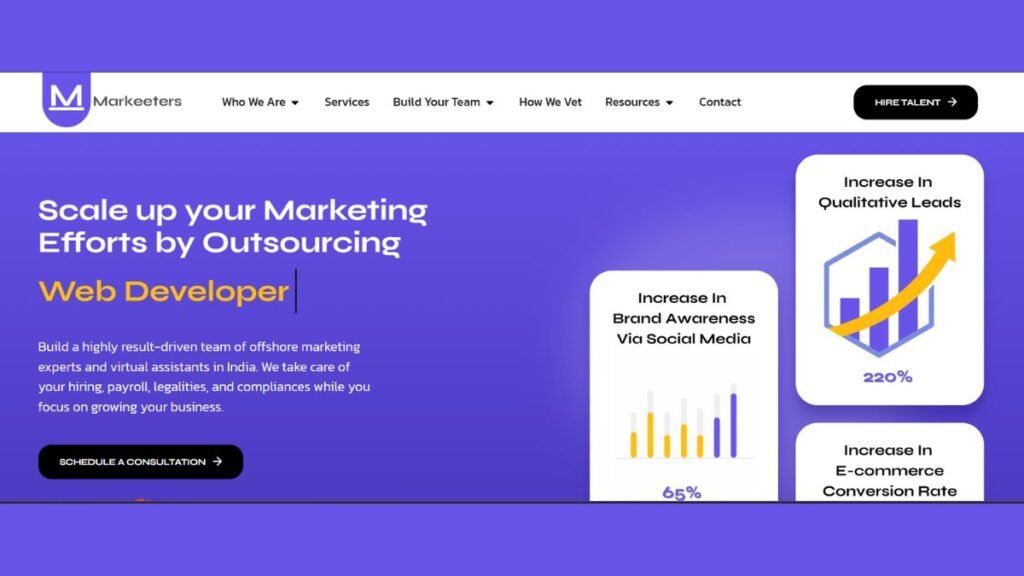Explore the pros and cons: Should You Hire Freelancers or Outsource to a Company? Make informed decisions for your business success. Read our blog to learn more.
Introduction
In this fast-paced world, businesses are always expanding and diversifying. Even if some well-established businesses have trained their employees to produce superior work, some companies lack the necessary resources and have an inadequate number of employees. Making the choice between hiring freelancers and outsourcing to a company is challenging, particularly if you own a small business or a startup.
In such scenarios, freelancers and outsourcing companies become relevant. With the help of these independent services, businesses can discover new opportunities and reach their target audience. Depending on their resources, businesses can make a choice between freelancers and outsourced companies. Let us help you understand the pros and cons of freelancers and outsourcing to a company.
Freelancing vs. Outsourcing to a Company
We have compiled a tabular representation highlighting the difference between freelancing and outsourcing to a company:
| Aspect | Freelancing | Outsourcing to a Company |
|---|---|---|
| Definition | Individuals offering services independently. | Hiring external agencies with specialized teams such as for services like marketing, payroll, IT, etc. |
| Flexibility | More flexible in terms of project. | Typically offers flexibility but may have contractual obligations and lead times. |
| Expertise | Varied skill levels; may specialize in specific areas. | Specialized teams with diverse expertise, often covering a wide range of marketing aspects. |
| Control | More direct control over individual freelancers. | Less direct control, but professional agencies often provide regular updates and reports. |
| Scalability | Limited scalability as it depends on the availability of freelancers. | Generally scalable with access to a pool of professionals, suitable for larger projects. |
| Quality Assurance | Quality may vary, depends on the individual freelancer’s skills. | Agencies often have rigorous quality control processes and standards. |
| Cost | Potentially cost-effective, especially for smaller projects. | Can be costlier, but offers a comprehensive approach and potential cost savings in the long run. |
| Communication | Direct communication with freelancers; may require more coordination. | Clear communication channels with dedicated account managers for streamlined interactions. |
| Timeline Management | Project timelines may be affected by the availability of freelancers. | Agencies often adhere to set timelines with structured project management. |
| Risk Management | Higher risk in terms of project completion and quality assurance. | Lower risk due to established processes, expertise, and accountability. |
| Long-term Relationship | May lack continuity as freelancers. | Potential for long-term partnerships, fostering consistency and understanding. |
Related articles:
The Future of Outsourcing – Latest Trends and Predictions
10 Business Tasks You Can Outsource as a Startup Easily
Should You Hire Freelancers or Outsource to a Company? – Pros and Cons
Pros & Cons of Hiring a Freelancer
It is projected that in 2027, 86.5 million people will be freelancing in the United States and will make up 50.9% of the total U.S. workforce. The gig economy is trending, and we can all see the emerging freelancers in the specialized industry.
Pros
Cost-Effective
To begin with, most freelancers charge reasonable prices that they determine for themselves. These might also change based on how long the project takes. Furthermore, there is no need to spend money on hours that were wasted. Hence, freelancers charge lower total costs. They charge money for the time spent on the project. Worldwide, the average freelancer earns $21 per hour. That is why, for small businesses, it is cost-effective to hire a freelancer to work on their projects.
Niche Focus
Freelancers emphasize one area of expertise, mostly niche specialization. If your business needs niche services such as SEO, social media, or content writing, freelancers are an optimal choice. They are qualified experts in their area of specialization. You can find a suitable freelancer that matches your job needs.
Flexibility
In contrast to bigger companies, startups and small-to-medium-sized businesses experience fluctuations between busy and less busy periods. It becomes challenging to forecast workforce demands as a result. Smaller businesses that choose to work with freelancers gain from having an additional team member during peak days and then end the contract when they are no longer required.
Cons
Communication and Control can be Challenging
With freelancers, communication is not always as simple as it is with workers. For instance, as a manager, you can stop by an employee’s desk to inquire about a particular assignment that is urgent or to get an update on the same. This is not feasible with freelancers, and depending on how quickly they answer, you could have to wait a few hours or even days to hear back.
Additionally, you have no influence on the procedure by which things are carried out. You can review and provide feedback to your in-house team as and when required. A freelancer will understand your brief and deliver the final output.
Difficulties in Employing a Freelancer
Few freelancers remain for an extended period of time and join the company while some just come and go. Most businesses only hire freelancers for short-term projects. The frequent cycle can be cumbersome and difficult for the workplace. Additionally, there is a slight chance that the quality of work can break down. Different freelancers will provide work of varying quality. That is why it is feasible to work with full-time employees for consistent results.
Pros & Cons of Outsourcing to a Company
Nearly 94% of businesses outsource some or all of their marketing activities.
Pros
Accountability
Outsourcing companies are more reliable and responsible. In real terms, they start with procedures like testing, quality assurance, crisis management, and project planning and management. Most of the time, this produced work of exceptional quality and expertise. Outsourcing companies wish to maintain their reputation, which is why workloads are managed with optimal efficiency.
Data Protection
Since agencies have many clients, they are more regulated and organized. It is expected of the agencies to have data protection procedures in place. For the comfort of their clients, they provide procedures, including non-disclosure agreements (NDAs) and contract partnership agreements. The contract protects your company’s information in the event of a breach.
Expert Team
It is unusual that you will come across a freelancer with enough skills set to meet all of your project needs at once. Outsourcing to a company gives you access to experts in several different fields (such as social media experts, web development experts, SEO specialists, content writers, etc.). As a result, you can collaborate with the agency on additional task requirements. You may work on many projects at once, which will save you time and get you ahead.

Cons
Slow Response Time
As a business, you don’t interact with just one person but with a team of experts. So, this may lead to slow response times from the team as they manage multiple projects. Though this isn’t the case for every agency. Look for a degree of flexibility and communication style.
High Cost
The cons of outsourcing to a company are their high expenses. There is no denying that freelancers are far less expensive. Agencies have a lot of costs involved, such as equipment, office space, bonuses, and other overhead. The bright side is that if you do thorough research and select the best agency for your business needs, you will receive what you pay for.
Conclusion
Both hiring a freelancer and outsourcing to a company have their pros and cons. For many small businesses, outsourcing is feasible, as they can delegate all their marketing needs to one agency and get the work done. However, one has to do comprehensive research to find a suitable agency.
If you want to be active in the process and need someone for smaller projects, hiring a freelancer is reasonable. It is a strategy that also helps you save on project expenses. But it also involves quality as it might not be up to the mark.
You have to understand the characteristics of your business, the kind and duration of your project, and the budget. You have to consider the pros and cons of hiring a freelancer and outsourcing to a company and make an informed decision.
Featured Articles: Unlock the Benefits of Outsourcing Digital Marketing Services to India
10 Myths About Outsourcing Marketing Services
How Outsourcing Can Improve Your Marketing ROI?
FAQs
Should I hire a freelancer or an agency?
Both agencies and freelancer have their advantages and disadvantages. You must select a course of action that aligns with your projects’ needs, objectives, and outputs. If you need a specific task done and are on a limited budget, freelancers are a better choice. If you have a long-term project which requires additional resources, then agencies are a better choice.
Can a freelancer be an agency?
Freelancers eventually have to decide between starting their own agencies or carrying on as freelancers. Establishing a freelance agency offers an abundance of opportunities for professional growth, despite the fact that it can be difficult choice requiring significant adjustments.
Is it better to hire a marketing agency?
Modern technology, analytics, and market intelligence are just a few of the many tools and resources that the majority of marketing agencies have access to, which internal team might not. You can achieve impactful results from the marketing campaigns.





